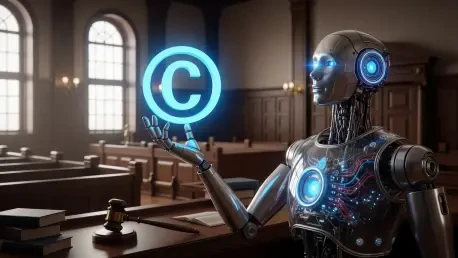The United Kingdom is actively addressing the rising tensions between artificial intelligence (AI) advancements and copyright laws, establishing expert working groups to mediate the ongoing disputes. As AI technology requires vast amounts of data to train its models, questions arise regarding the use of copyrighted materials without explicit consent. This scenario calls for urgent attention, as AI developers seek less restrictive data access, clashing with content creators who demand protection and compensation for their intellectual property. The UK government is stepping in to facilitate dialogue and establish a balanced policy framework.
Industry Overview
The intersection of AI and copyright is rapidly becoming a critical area for industry stakeholders. AI technology holds tremendous potential for innovation, yet its reliance on copyrighted content poses significant challenges within current regulatory frameworks. Key players such as Amazon, Meta, and OpenAI are driving technological advancements, while creative industries, including publishers and musicians, emphasize the importance of safeguarding their copyrighted works. The UK’s legal landscape attempts to navigate these complexities amid evolving technological advancements, offering both opportunities and obstacles in AI-related copyright management.
Industry Trends and Projections
Influencing Trends
Major trends are reshaping the AI-copyright debate. Technological breakthroughs in AI are broadening its capabilities, stirring concerns among content creators who worry their work is used without authorization. Content creators seek transparent practices from AI developers regarding how their materials are implemented. Conversely, AI developers aim to relax copyright constraints to foster innovation. Bridging these divergent needs requires tailored solutions acknowledging each party’s priorities while safeguarding economic and creative interests.
Market Outlook
Data reveal promising growth potential in the AI industry, with experts forecasting advancement in areas such as healthcare, entertainment, and environmental applications. This growth, however, hinges on resolving AI developers’ data access challenges and content creators’ desire for control. Anticipated legislative adjustments aim to bring clarity to copyright matters and harmonize sector expectations. Industry stakeholders must remain adaptable to capitalize on emerging opportunities facilitated by constructive policy shifts addressing AI’s growth trajectory.
Challenges and Strategies
Navigating the conflicting interests between AI developers and content creators involves multifaceted challenges. Technologically, AI’s reliance on copyrighted content presents hurdles to innovation. Regulatory constraints and uncertain market dynamics further complicate the path ahead. Implementing strategies involves considering content creators’ demand for transparency and AI developers’ need for relaxed restrictions. Officials advocate for increased collaboration and technological solutions to facilitate controlled access while incentivizing innovation through legislative adaptability.
The Regulatory Environment
The UK’s legal framework concerning AI’s use of copyrighted materials navigates a complex landscape of evolving laws and proposed amendments. Significant legislation includes the Data (Use and Access) Act, which involves AI-related copyright protections. Examining compliance implications and industry practices within this framework is crucial as stakeholders adjust to legislative developments. Successful integration of laws and regulations involves balancing strict protections with flexible provisions supporting AI’s potential to offer broad societal benefits.
Future Outlook
Looking ahead, AI and copyright interactions are poised for transformative developments. Innovation is expected to surge as AI capabilities expand, altering consumer behaviors and challenging existing copyright norms. Anticipated legislative changes will shape how stakeholders operate within this space, requiring the adoption of innovative solutions and adaptability. Industry actors must remain proactive in addressing emerging issues while leveraging evolving technologies to unlock economic potential, ensuring intellectual property protections align with AI advancements.
Conclusion
The establishment of expert working groups marks a significant milestone in addressing AI-copyright tensions. These groups aim to offer informed solutions navigating divergent stakeholder interests where transparency, rights control, and policy refinement are critical. As the government strives to institute a balanced approach, industry momentum reflects efforts to harmonize AI innovation with copyright protections. Legislative adaptability, underpinned by these expert dialogues, highlights the path forward, fostering both creative integrity and technological evolution in a rapidly advancing landscape.









